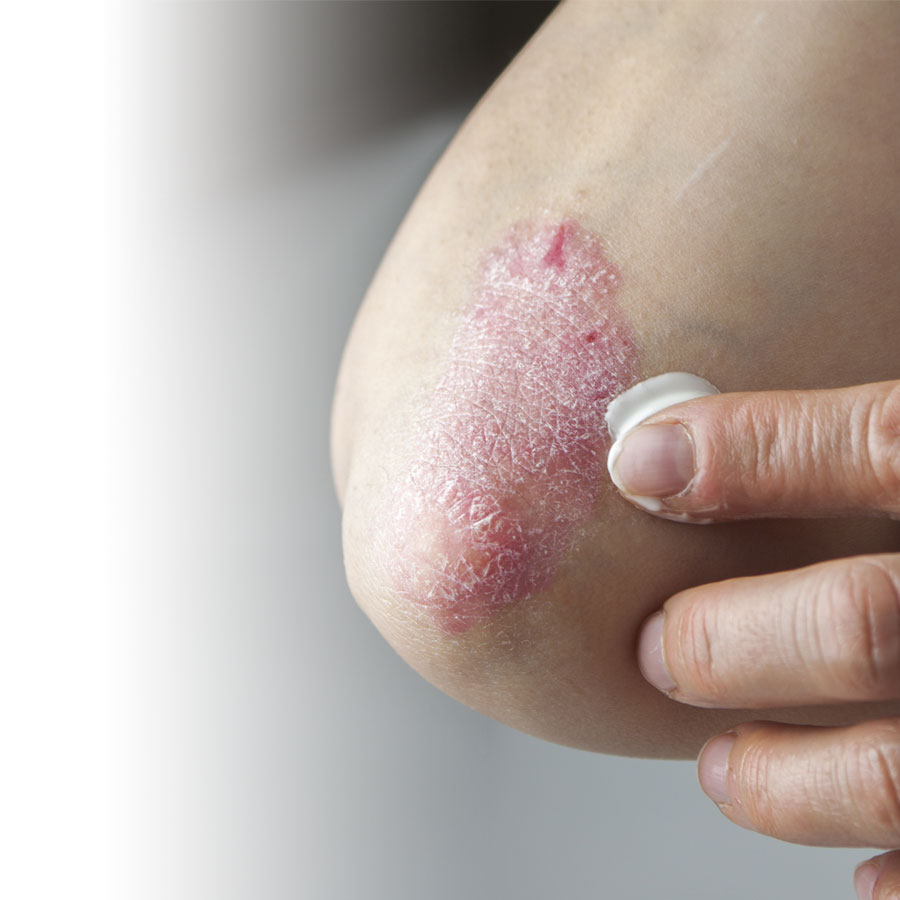Psoriasis is a rather common non contagious skin disease. Learn how to prevent and treat it.
What is psoriasis?
Psoriasis is a chronic inflammatory skin disease, of which there are several types. The most common form is plaque psoriasis, which manifests itself by recurrent red plaques covered with squama (whitish scales that fall off the skin).
The extent of psoriasis varies from one person to another, ranging from localized plaques to a generalized skin condition. Psoriasis plaques are often found on the elbows, scalp, buttocks and knees, but can also affect other parts of the body, such as the face, hands and feet.
What are the symptoms of psoriasis?
Some areas of the skin become rough, dry and thick. Often, the skin under the plaques is pink. Almost 70% of people with psoriasis experience itching. In addition to the areas of the body most frequently involved, psoriasis can also affect the toenails and fingernails. The symptoms can vary from mild to severe. The following factors, among others, can cause a flare-up of psoriasis, leading to the onset of plaques:
- wound on the skin
- drinking alcohol
- psychological stress
- allergic reaction
- exposure to the cold
What type of care should be given to skin?
Moisturizers
Moisturizing skin helps to reduce redness and itching and promotes healing. Dermatologists recommend applying a daily moisturizer, ideally a product with emollient properties and specially made for sensitive skin.
It is also advisable to use a cleanser specially formulated for sensitive skin. Your pharmacist or cosmetician can help you choose the best products for your skin.
Exposure to the sun and ultraviolet rays
Generally speaking, psoriasis plaques diminish, and sometimes disappear, when they are exposed to the sun. Natural sunlight is the simplest and fastest way to end a flare-up. However, it is important to discuss this with your doctor, as excessive sun exposure should be avoided. In fact, a sunburn can trigger a new flare-up.
Phototherapy, or light therapy, involves exposing the skin to ultraviolet rays on a regular basis. UVB rays penetrate the skin and slow down skin cell growth of the affected areas. This type of treatment requires medical supervision to ensure your safety and to prevent overexposure to light.
How important is lifestyle?
Certain habits can predispose a person to psoriasis or influence the course of the condition. Here is some advice intended to prevent psoriasis.
- Abstain from smoking.
- Avoid overconsumption of alcohol.
- Learn to better manage stress.
- Dress appropriately and protect your skin when you go out into the cold.
- Humidify the air in your home if it is dry using a humidifier.
How is psoriasis treated?
Although the treatment of psoriasis has been the subject of much research, it is still not possible to cure the disease. However, several types of drugs help to control psoriasis by regulating skin cell growth and reducing the accumulation of squama, redness and inflammation. Treating psoriasis lesions as soon as they appear can stop its progression and limit the severity of the flare-up.
Topical Medications
Topical treatments–medications applied to the skin–are usually the first line of defense in treating psoriasis. These formulations can include, for example:
- cortisone derivatives
- vitamin D derivatives
- vitamin A derivatives
- tar
- salicylic acid
- anthralin
Oral medications
To relieve psoriasis sufferers who do not respond well to topical treatments, alternative options can be considered. There are systemic treatments available that can be prescribed orally (in liquid or pill form) or by injection, which can be divided into two categories: “traditional systemics” and “biologics”. The frequency with which these medications are administered varies; it is important to discuss all of the available treatment options with your doctor to determine what is best for you.
Your pharmacist can inform you about the products available, topical or other types, and help you to make optimal and safe use of them.
Don’t hesitate to speak to your pharmacist if you have any questions about psoriasis and the ways to treat it.

